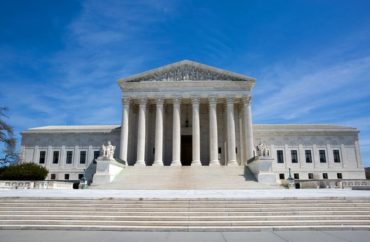
As colleges and universities await the Supreme Court’s decision on the fate of affirmative action, many experts have speculated that a conservative majority of the judges will rule against the practice, but that litigation over the topic of race-based admissions will likely be far from over.
The nation’s highest court is reviewing two companion cases brought by Students for Fair Admissions against the University of North Carolina and Harvard. The plaintiffs argue admitting or rejecting students based on skin color is a violation of fundamental constitutional liberties.
While the lower courts upheld affirmative action, Students for Fair Admissions asked the nation’s highest court to reverse the decision and eliminate race as a determining factor for college admissions. The decision is expected to be handed down sometime this month.
“When ‘affirmative action’ means racial preferences, it violates the Constitution and civil rights laws,” Adam Kissel, visiting fellow at the Heritage Foundation Center for Education Policy, told The College Fix via email.
“It is hazardous to speculate,” he said, yet added he believes “the Supreme Court will hold that colleges may never use race as a factor in admissions decisions.”
“But when it just means making race-conscious decisions, it’s more complicated.”
According to a Cato Institute analysis, if the justices outlaw consideration of race, universities will likely use other factors, such as socioeconomic status or geographic location.
“There is already evidence of this,” according to the analysis. “Passed in 1996, California Proposition 209 prohibits state government institutions, including public education, from considering race, sex, or ethnicity.”
The analysis postulates the court will rule against the specific admissions policies that Harvard and UNC have relied on, which give specific racial preference to African Americans, Hispanics and Native Americans: “SFFA claims that universities are adopting de facto quotas by prioritizing minority applicants over Asian Americans who have stronger academic records.”
Students for Fair Admissions argued: “If California and Michigan can maintain elite public universities without sorting applicants by race, then North Carolina can, too.”
Jeffrey Miron, vice president for research at the Cato Institute and director of graduate and undergraduate studies in the Department of Economics at Harvard University, told The College Fix via email that the court “will not rule against any consideration of race” as a holistic approach to admissions.
“It is not trivial, however, to draw a clear line between these two approaches.”
For those reasons, the implications of the court’s ruling may be unclear and lead to further litigation, Miron added.
Many colleges and universities have already shifted their programs for recruitment and college admission. The Cato analysis pointed out the University of California system “switched to proxies for race, such as family income and neighborhood circumstances, to continue promoting ‘diversity and equal opportunity.’”
Miron said universities like Harvard and UNC will likely try to modify admissions policies and utilize factors correlated with race, such as zip code or graduating high school, to make informed decisions about possible applicants.
Private high schools, like one in Northern Virginia, have already attempted to do just that. Last month, the federal appeals court of Virginia held that Thomas Jefferson High School may continue to consider zip code as a race by proxy for affirmative action admissions.
Judge Robert King, a Clinton appointee, ruled that “we are satisfied that the challenged admissions policy does not disparately impact Asian American students.”
GianCarlo Canaparo, senior legal fellow at the Heritage Foundation, told The College Fix that “universities have been using race-based means for race-based ends.”
Assuming that UNC and Harvard lose in this case, there will be future litigation determining whether race-neutral means are constitutional. Canaparo said the legal battle will be particularly fierce in the areas of politics, freedom of information, and sunshine laws. As alternative, race-neutral plans are implemented, litigation will continue, he said.
As for the current case before the Supreme Court, either it will rely strictly on the statutory text of Title VI and follow the color-blind approach, or take a stance theorized by GMU Antonin Scalia Law School Professor David Bernstein’s analysis of racial categories.
Bernstein argued racial and ethnic classifications are “arbitrary and inconsistent” and do not “reflect biology, genetics, or any other objective source.”
“An arbitrary classification is the hallmark of what violates the Equal Protection Clause,” Bernstein argued.
MORE: Ahead of affirmative action ruling, 83% of colleges and universities now SAT/ACT optional
IMAGE: Steven Frame / Shutterstock





Please join the conversation about our stories on Facebook, Twitter, Instagram, Reddit, MeWe, Rumble, Gab, Minds and Gettr.